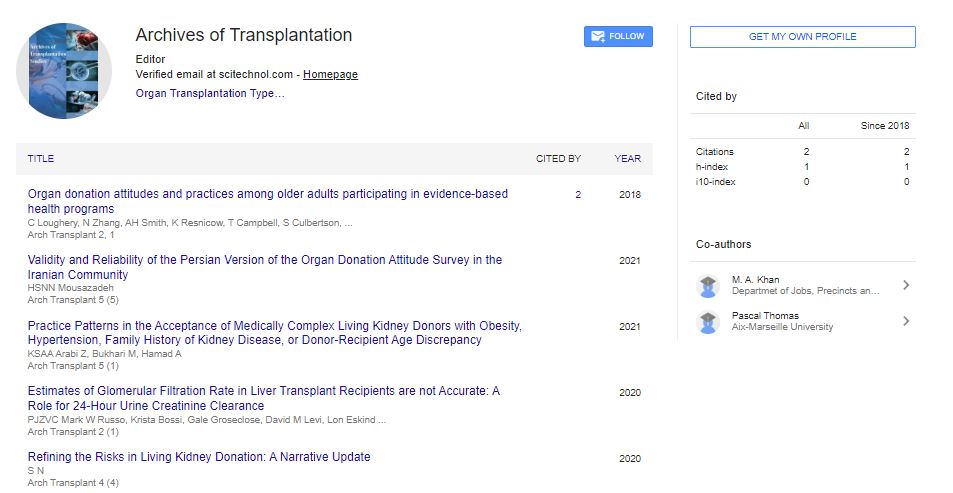Commentary, Arch Transplant Vol: 7 Issue: 4
Strategies for Prevention and Management of Transplant Infections
Markin Balard*
1Department of Medicine, University of Chicago Medicine, Chicago, United States of America
*Corresponding Author: Markin Balard,
Department of Medicine, University of
Chicago Medicine, Chicago, United States of America
E-mail: markin_balard@ucm11.edu
Received date: 22 November, 2023, Manuscript No. AT-24-124978;
Editor assigned date: 24 November, 2023, PreQC No AT-24-124978 (PQ);
Reviewed date: 11 December, 2023, QC No. AT-24-124978;
Revised date: 19 December, 2023, Manuscript No. AT-24-124978 (R);
Published date: 26 December, 2023, DOI: 10.4172/AT.1000157
Citation: Balard M (2023) Strategies for Prevention and Management of Transplant Infections. Arch Transplant 7:4.
Description
Transplantation has emerged as a life-saving medical intervention, providing hope to individuals with organ failure. However, this remarkable progress comes with the inherent risk of infections that can jeopardize the success of the transplant. It explores key strategies for the prevention and management of transplant infections, aiming to ensure the well-being of recipients and the longevity of transplanted organs. The foundation for preventing transplant infections lies in rigorous pre-transplant screening and evaluation. Thorough assessment of both the donor and recipient helps identify potential infectious risks. Screening for common pathogens, such as viruses and bacteria, allows for informed decision-making, ensuring that only organs with acceptable infection risk are transplanted.
Immunization is a key strategy to fortify transplant recipients against preventable infections. Ensuring that recipients are up-to-date on vaccinations before transplantation provides an added layer of defense. Tailored immunization protocols, including booster shots and specific vaccines, contribute to the overall resilience of the recipient's immune system. Prophylactic antimicrobial therapy is often employed to reduce the risk of immediate post-transplant infections. Administering antibiotics or antiviral medications based on the recipient's medical history and the characteristics of the transplanted organ can significantly reduce the likelihood of early infections.
While immunosuppression is necessary to prevent organ rejection, it simultaneously increases the vulnerability of transplant recipients to infections. Personalized immunosuppressive regimens, tailored to the individual's risk profile, can strike a balance between preventing rejection and minimizing infection risk. Post-transplant surveillance is an essential component in the management of transplant infections. Regular monitoring for signs of infection, including fever, changes in laboratory parameters, and clinical symptoms, allows for early detection and prompt intervention. Swift identification of infections enhances the likelihood of successful treatment.
In the event of confirmed infections, employing targeted antimicrobial therapies is vital. Culturing and identifying the specific pathogen enable healthcare professionals to prescribe antimicrobial agents with precision, avoiding unnecessary broad-spectrum treatments and minimizing the risk of antibiotic resistance. Patient education plays a pivotal role in infection prevention. Providing transplant recipients with comprehensive information about infection risks, preventive measures, and the importance of medication adherence empowers them to actively participate in their own care. Adherence to prescribed medications and follow-up appointments is essential for long-term infection management.
Implementing isolation protocols during the early post-transplant period can reduce the risk of exposure to infectious agents. This is especially important for patients receiving transplants in healthcare settings where multidrug-resistant organisms may be prevalent. Transplant infection management requires a multidisciplinary approach. Close collaboration between transplant surgeons, infectious disease specialists, immunologists, and other healthcare professionals ensures a comprehensive and coordinated response to infections. Regular communication and joint decision-making contribute to optimal patient outcomes.
Ongoing studies and innovation are essential for advancing strategies in transplant infection prevention and management. Developing new diagnostic tools, antiviral medications, and immunosuppressive agents with improved infection profiles contribute to the evolving landscape of transplant medicine. The significance of these strategies for the prevention and management of transplant infections cannot be overstated. Beyond safeguarding the health of transplant recipients, these measures contribute to the overall success and sustainability of organ transplantation programs.
By reducing infection risks, healthcare professionals enhance the quality of life for recipients and improve the long-term viability of transplanted organs. The significance extends beyond individual cases to the broader impact on healthcare systems. Successful infection prevention and management strategies reduce the burden on healthcare resources, decrease the need for prolonged hospital stays, and contribute to overall cost-effectiveness in transplantation procedures.
Conclusion
The prevention and management of transplant infections demand a holistic and proactive approach. By integrating pre-transplant screening, immunization, vigilant surveillance, personalized care, and innovative strategies, healthcare professionals can navigate the delicate balance between preventing organ rejection and minimizing infection risks. As the field of transplant medicine continues to evolve, these strategies will play an essential role in ensuring the success and longevity of transplantations, providing recipients not only a second chance at life but also a safeguard against potential infectious challenges.
 Spanish
Spanish  Chinese
Chinese  Russian
Russian  German
German  French
French  Japanese
Japanese  Portuguese
Portuguese  Hindi
Hindi 